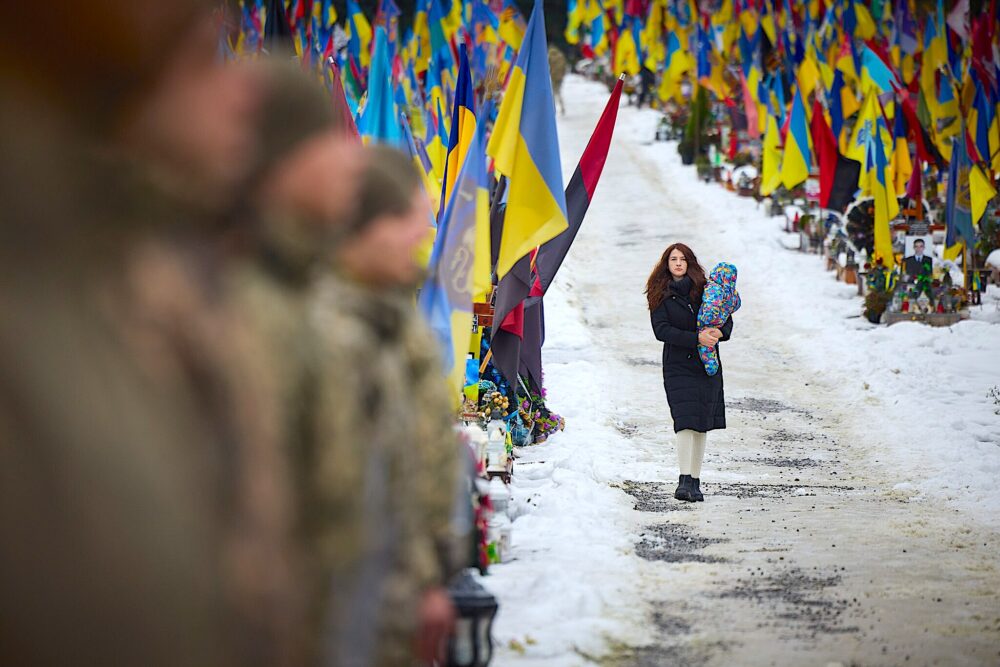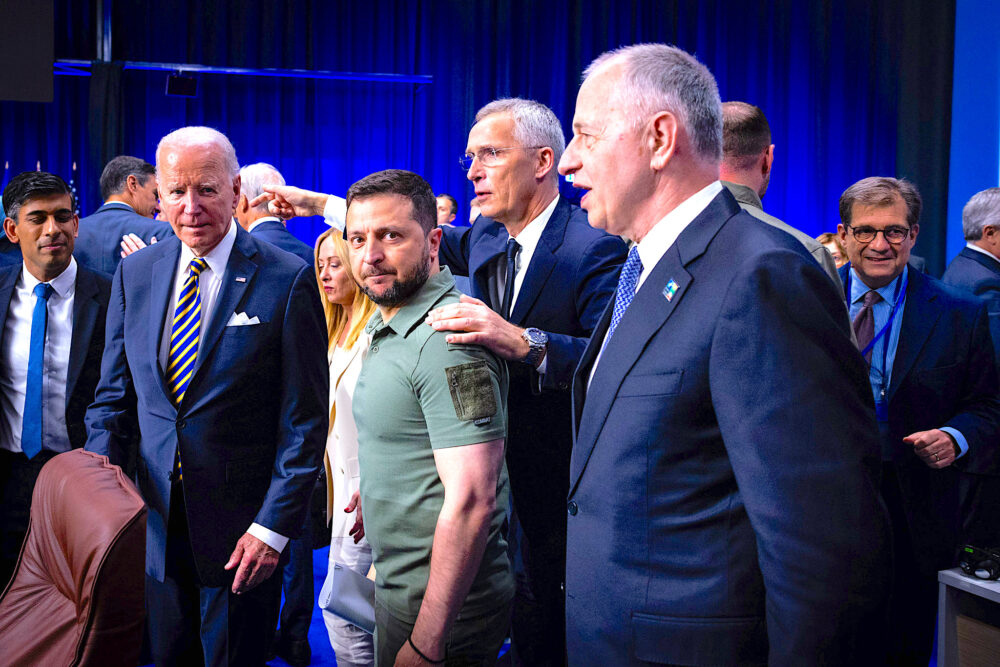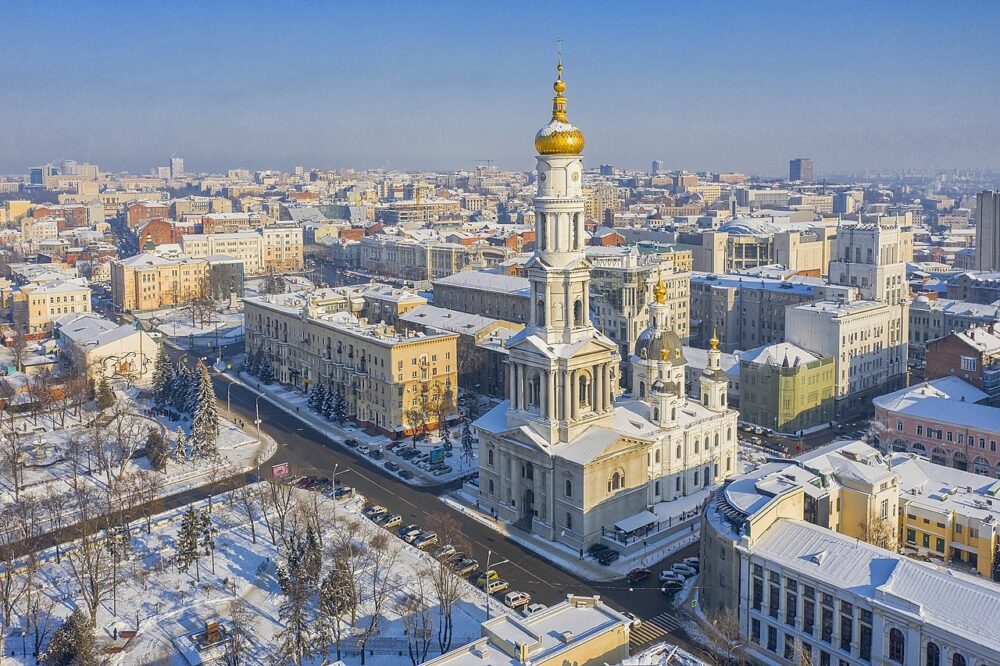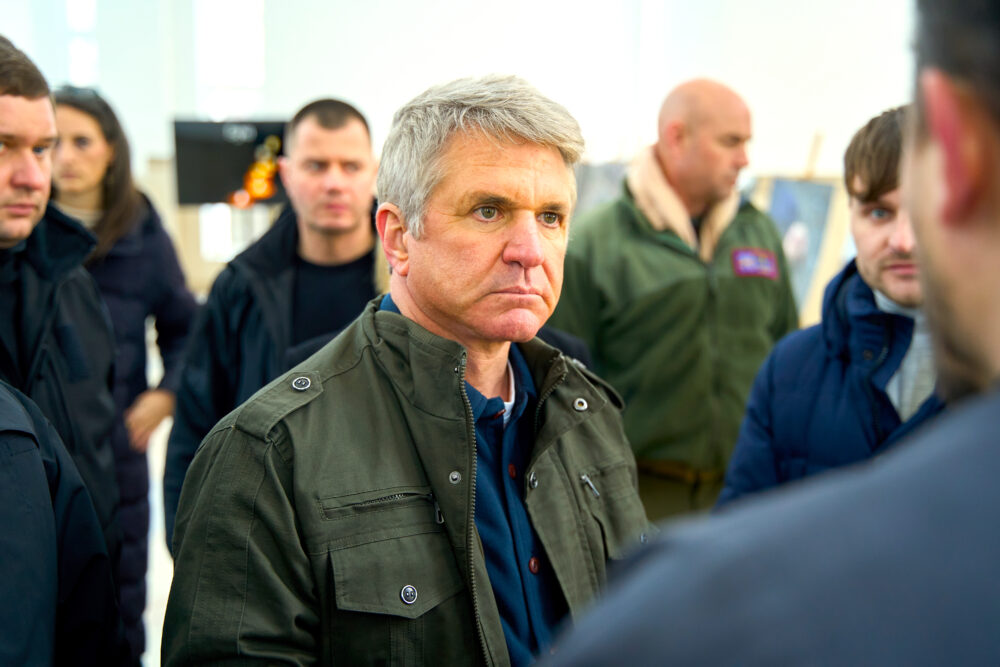Source: Consortium News
PATRICK LAWRENCE: US Endgame in Ukraine — War Without End, Amen
What happens when a powerful nation cannot afford to lose a war it has already lost?

Field of Mars at the Lychakiv Military Cemetery in Lviv, Ukraine, Dec. 2023. (President of Ukraine/Wikimedia Commons)
By Patrick Lawrence
Special to Consortium News

It is now two and a half years since Moscow sent two draft treaties, one to Washington, one to NATO in Brussels, as the proposed basis of talks toward a new security settlement — a renovation of relations between the trans–Atlantic alliance and the Russian Federation.
An urgently needed renovation, we must quickly add. And after that we must also quickly add the Biden regime’s rejection of Russia’s proposals as a “nonstarter” faster than you can say “deluded.”
Let us pause for a sec to bring to mind all those who have died in the war that erupted in Ukraine a year and a few months after Joe Biden refused, even mocked, Vladimir Putin’s honorable diplomatic demarche. All the maimed and displaced, all the towns and cities destroyed, all the farmland turned into moonscape.
And the all-but-complete peace accord, negotiated in Istanbul a few weeks into the war that the U.S. and Britain rushed to scuttle. And of course all the billions of dollars, somewhere north of $100 billion now, not spent on improving Americans’ lives but spent instead on arming a regime in Kiev that steals aid extravagantly while fielding an army with professed neo–Nazis.
It is useful to recall these things because they give context to a string of recent developments it’s important to understand, even if our corporate media discourage any such understanding.
If we keep recent history in mind, we will be able to see that the viscously irresponsible decisions of a couple of year ago, so wasteful of human life and common resources, are now repeated such that it is now certain the brutalities and waste will continue indefinitely even as their pointlessness is now way, way, way beyond denying.
The doorway opening on to this new sequence of events is the recent advance of the Russian military in Ukraine’s northeast. This new incursion now threatens Kharkiv, which is Ukraine’s second-largest city and lies a mere 25 miles from the Russian border.
Even the mainstream press, loathe to report the setbacks the Armed Forces of Ukraine (AFU) have suffered, describes Russia’s northeast campaign, which began a few weeks ago, as a rout. The Kremlin says it has no interest in taking Kharkiv, and this so far appears to be the case.
But the AFU’s rapid retreat bears a strong whiff of final defeat wafting in from not so far off in the distance. “Several Ukrainian combat brigades have not defected, or considered doing so,” Seymour Hersh, quoting his customary “I have been told” sources, reported in his newsletter last week, “but have made it known to their superiors that they will no longer participate in what would be a suicidal offensive against a better trained and better equipped Russian force.”
Brigades average 4,000 to 5,000 soldiers each and can run to 8,000 or even more. Hersh’s report suggests that a considerable number of Ukrainian troops, and maybe a very considerable number, are now effectively in mutiny against the AFU’s high command.
In evident response to Russia’s swift new incursion and the direction of the war altogether, the well-coordinated if not very artful American propaganda machine has begun preparing the public for a wider war that is to extend, as a matter of policy and military strategy, into Russian territory. This effort began with a New York Times interview with Volodymyr Zelensky, which was videoed and published in last Wednesday’s editions. A transcript of the interview is here.
This document is plainly intended to appeal to kale-consuming, Biden-supporting liberals who must be assured of the Ukrainian president’s just-like-us humanity and good judgment. He talked about his children and his dogs — there must be dogs in this sort of imagery — and how he reads fiction every night but is too tired to get very far.
But the core point, beyond the window dressing, was to insist that it is time to begin bombing Russian territory and that the Biden regime must reverse its prohibition of such operations.
A key passage:
“So my question is, what’s the problem? Why can’t we shoot them down? Is it defense? Yes. Is it an attack on Russia? No. Are you shooting down Russian planes and killing Russian pilots? No. So what’s the issue with involving NATO countries in the war? There is no such issue.
Shoot down what’s in the sky over Ukraine. And give us the weapons to use against Russian forces on the borders.”
Zelensky, a television actor we must not forget, has played this role on numerous occasions: Badger us for tanks, planes, long-range artillery, and missiles, the script written in Washington reads, and we will hesitate briefly before granting you your pressing needs as you defend democracy, the free world, and all those other “values” in the Cold War inventory.
Two days later, two, the Times reported exclusively that U.S. Secretary of State Antony Blinken, returning from “a sobering visit to Kyiv,” has of a sudden decided it is indeed time to broaden the war in the direction of a direct confrontation with Russia. The byline on this piece is worth noting: It belongs to David Sanger, who typically writes this kind of deep-inside piece because he is by all appearances so unwholesomely deep inside.
“There is now a vigorous debate inside the administration over relaxing the ban,” our David reports, “to allow the Ukrainians to hit missile and artillery launch sites just over the border in Russia—targets that Mr. Zelensky says have enabled Moscow’s recent territorial gains.”
See what I mean by artless? The one-two of this perception-management op has all the finesse of the old MAD magazine. I am beginning to take offense, honestly. If I am going to be subjected to incessant propaganda, I demand, I absolutely demand that it is sufficiently sophisticated to be at least entertaining.
In between the Zelensky interview and the Sanger report, the Russophobes in Congress wasted no time tucking into this operation. Michael McCaul, the Texas Republican who ranks with Tom Cotton among the prominent dummköpfe populating Capitol Hill, pounced partisanly last Wednesday.
McCaul, who chairs (I can hardly believe this) the House Foreign Affairs Committee, stood before a map that showed — my best count — 50 or so targets in Russian territory. And there he went for a twofer, arguing in favor of removing restrictions on the deployment of U.S. weapons while turning the question into a boringly pointless attack on the Biden regime.
“We have a really bad situation going on, as you know. This is a sanctuary zone they [Russians] have created…. However, your administration and Jake Sullivan [sic] have restricted the arms use so that Ukraine cannot defend itself and fire back at Russia. That’s why I mandated the attacks in the supplemental [the aid package Biden signed into law last month], the long-range, the short range, and the HIMARS that your administration is tying their hands arms behind their back.”
Never mind the incoherence. A sanctuary? The Russians have created a sanctuary on their own soil? What kind of language is this? What is running through McCaul’s odd mind, the Cambodian border in the spring of 1969, Operation Menu?
Let us all declare we feel unsafe as we realize what these people are talking about and what they are risking. Any allowance for expanded use of U.S.–made weapons against Russian targets, which will require American personnel on the ground in Ukraine, will unambiguously escalate the proxy war into a direct conflict between the U.S. and the Russian Federation.
Quagmire, anyone?
Reuters filed an impressive, equation-changing exclusive last week featuring unmistakably intentional leaks from the Kremlin signaling President Putin’s desire to stop the war in Ukraine and negotiate a ceasefire. Guy Faulconbridge and Andrw Osborn cited interviews with “five people who work with or have worked with Putin at a senior level in the political and business worlds.”
Time to sit up.
“Three of the sources, familiar with discussions in Putin’s entourage,” the two correspondents reported, “said the veteran Russian leader had expressed frustration to a small group of advisers about what he views as Western-backed attempts to stymie negotiations and Ukrainian President Volodymyr Zelenskiy’s decision to rule out talks.”
They then quoted one of their sources, “a senior Russian source who has worked with Putin and has knowledge of top-level conversations in the Kremlin,” as asserting, “‘Putin can fight for as long as it takes, but Putin is also ready for a ceasefire—to freeze the war.’”
While Putin has sent such signals on numerous occasions over the course of the past decade of war, this is big, in my view. For one thing, it strongly indicates what the new Kharkiv campaign is all about. Moscow does not want to take Kharkiv, the Faulconbridge and Osborn reporting suggests: It wants to enter talks from the position of strength all sides in all conflicts seek in the pre-negotiation phase.
Some other details confirm what distinguishes this set of signals from the Kremlin from others sent previously. From the Reuters report:
“Three sources said Putin understood any dramatic new advances would require another nationwide mobilisation, which he didn’t want, with one source, who knows the Russian president, saying his popularity dipped after the first mobilisation in September 2022.
The national call up spooked part of the population in Russia, triggering hundreds of thousands of draft age men to leave the country. Polls showed Putin’s popularity falling by several points.”
Interesting. Another reason to listen to what the Kremlin wants to world to know just now.
I am not going to buy Reuters’ suggestion that Putin has a case of political nerves. He has just won a new six-year term as president. But the Russian leader has demonstrated numerously in the past that he is sensitive to popular sentiment, the sacrifices of soldiers absent from their communities and places of work, and the visuals of war — body bags at airports, rows of military graves.
As Faulconbridge and Osborn report, Putin continues to reject the Zelensky regime’s insistence that no talks can begin until Ukraine regains all territory it has surrendered since the war began in 2014, including Crimea. “Let them resume,” they quote Putin as saying Friday, “[but] not on the basis of what one side wants.”
Via his leaky confidants, who were almost certainly authorized, Putin proposes what amounts to an armistice. Both sides would stop shooting, and territorial dominion would remain as it is—not necessarily etched into the earth, but until both sides can negotiate on to another step toward a lasting settlement.
No, Kiev would not regain Crimea or the four republics that voted in September 2022 to rejoin Russia; and no, Russia would neither have demilitarized nor de–Nazified Ukraine, as it has many times stated as its aims.

From left, Rishi Sunak, Biden; Giorgia Meloni, Zelensky NATO Secretary General Jens Stoltenberg and NATO Deputy Secretary General Mircea Geoana in Vilnius on July 12, 2023. (NATO, Flickr, CC-BY-NC-ND 2.0)
There is a legal principle here that goes back to the Romans. Qui tenet teneat—“he who holds may go on holding,” roughly — is often a feature of Asian diplomacy, which is more accepting of fluidity and temporary uncertainties that Westerners are usually not prepared to accept. Chas Freeman, the noted diplomat, taught me this years ago via the complex disputes over maritime jurisdictions in the South China Sea.
Putin’s proposal, viewed in this context, seems to me the most promising thought out there at the moment, and — to be noted — a number of officials and commentators in the West have bruited the idea about in recent months.
“A frozen conflict, such as those in Kashmir, Korea and Cyprus,” John Whitbeck a noted international attorney, said in a privately circulated memo the other day, “while not ideal, would be far better than more war and very much in the interests of mankind.”
This brings us back to… to December 2021, actually. Now as then, neither Kiev nor Washington has any interest in promising thoughts.
Biden’s national security people have not even stirred to react to the Faulconbridge and Osborn report. You would have thought they would at least have trotted out “nonstarter,” their favorite Britishism.
The Zelensky regime immediately responded to the Faulconbridge and Osborn report with another attack, again not short of its usual ad hominem tint. “Putin currently has no desire to end his aggression against Ukraine,” Dmytro Kuleba, Kiev’s amateurish foreign minister, told Reuters. “Only the principled and united voice of the global majority can force him to choose peace over war.”
Putin. His aggression. No desire to end it. I simply cannot see how anyone can take this seriously as statecraft. It is performative posturing, nothing more.
As to the voice of the global majority Kuleba mentioned, wait for it. This is a reference to a conference Zelensky and his ministers have organized for two days in mid–June. The Swiss have agreed to host it at a resort owned by the Qatari government near Lake Lucerne, and the Swiss Foreign Ministry, buying into the Ukrainians’ pretensions, is calling it “a peace summit.”
A peace summit? Please tell me how this works. The Russians are not even invited. What it amounts to is a Ukrainian attempt to get the world to line up behind it as it continues to wage a war it has already lost. As a former Swiss official said to me over dinner Saturday evening, “It’s about money. Kiev needs money.”
There is talk here that Biden plans to attend, but my money says this is out. Zelensky said in mid–April he expects 80 to 100 heads of state, but I question this, too.
As of May 15, Le Monde reports, about 50 nations had responded to Bern’s invitation. Remember, 80 percent to 90 percent of the globe, measured by population or by counting sovereign nations, has remained resolutely nonaligned on the Ukraine question.
Swiss peace conferences, planted New York Times interviews, congressmen sounding foghorns as they cheer on an expanded war: I find all this extravagantly pitiful. Maybe Putin is serious about his proposed armistice, maybe there is less in it than it seems. But no one on the opposing side wants even to explore the idea of ending the war?
The net response to the new Russian advances toward Kharkiv and the Kremlin’s artful leaks last week is to launch a new phase in a proxy war the West has already lost — a phase that also seems to have little chance of success, but holds more danger than any truly responsible statesman would ever risk.
Dmitry Peskov, the Kremlin’s dapper spokesman, told Faulconbridge and Osborn the other day that Russia didn’t want “an eternal war,” a forever war in the American idiom. This is a good thing not to want.
Neither Biden nor Zelensky, on the other hand, wants this war to end: They cannot afford it for a variety of reasons. This is the reality. They are the main impediment to peace. They have painted the conflict as some kind of cosmic confrontation between good and evil, and in so doing they have also painted themselves into a corner.
But what happens when a powerful nation cannot lose a war it has already lost?
Patrick Lawrence, a correspondent abroad for many years, chiefly for The International Herald Tribune, is a columnist, essayist, lecturer and author, most recently of Journalists and Their Shadows, available from Clarity Press or via Amazon. Other books include Time No Longer: Americans After the American Century. His Twitter account, @thefloutist, has been permanently censored.


No comments:
Post a Comment